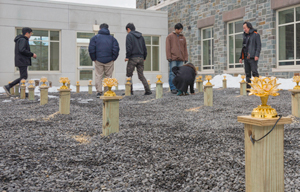Playing the game
Updated: 2013-04-22 10:07
By Eric Jou (China Daily)
|
||||||||
 |
|
Western gamers have become Chinese video game developers' new target audience. Provided to China Daily |
Chinese-made video games are moving into international markets and 'Westernizing' to appeal to a wider audience. Eric Jou reports.
Holy Chinese paladin swordsmen, shiny dragons and flying monks - all staples of Chinese online games - are getting new life as Chinese video games move out of the Middle Kingdom and into the wider world.
The move into international markets is giving Western players such as Brian Cohen a chance to join the massive world of Chinese games.
Cohen, from the United States and a game developer himself, says he plays lots of video games but he did not have the chance to play a Chinese-made game until recently. He is now working his way through the multi-player online role playing game Age of Wushu.
Before playing the Chinese game Cohen, like many people in the West, had the common misconception that Chinese games are terrible. However, after playing Age of Wushu, Cohen was hooked.
"After playing Age of Wushu my preconceived notions were blown away," Cohen says. "I would definitely be willing to try other Chinese-made games."
China's domestic online video gaming market reached record highs in 2012, earning $9.7 billion in revenue according to a report published by the Chinese Video Game Industry. That's a 35.1 percent increase from 2011.
While the domestic market is still growing and is expected to reach even higher levels of revenue, Chinese companies are looking to expand their audience by bringing the same games that the Chinese enjoy to the wider world. They are doing this in the same way Chinese movies were brought to the West - localization and translation.
Localization is the process of taking a work, be it film, book or video game, and translating it in a way that makes sense for a region.
"Any good localization or translation in general has to be smooth in the country it's in, the exception would be something that was meant or intended to be bizarre or weird," says Joshua Dyer, a translator who specializes in localization in China. "Most of the time, you don't want any barrier to play."
Dyer, from the US, has been working in the Chinese game industry since early 2009. He says his job is primarily translation, translating the Chinese in domestically created games into English.
Over the course of the last four years Dyer has seen an increase in the number of Chinese developed online video games heading out West. According to Dyer, the majority of the games he's seen "leaving" China are massively multi-player online role playing games and simulation type games. Dyer says Chinese developers are aiming to bring in more players and extend their reach.
|
|
|
| Ear to the ground | More people enjoy being trapped in 'secret chambers' |

 Weekly Photos: April 15-21
Weekly Photos: April 15-21
 Residents given shelter in quake-hit region
Residents given shelter in quake-hit region
 US company successfully launches space rocket
US company successfully launches space rocket
 Police: Bombing suspects planned more attacks
Police: Bombing suspects planned more attacks
 Premier: Rescue every person
Premier: Rescue every person
 Chinese soldiers clear mines, win hearts
Chinese soldiers clear mines, win hearts
 Credibility still top concern for Chinese firms
Credibility still top concern for Chinese firms
 More bird flu patients discharged
More bird flu patients discharged
Most Viewed
Editor's Picks

|

|

|

|

|

|
Today's Top News
Rescuers race against time for quake victims
PBOC urges speed in approving changes to IMF
US general visits China for military relations
Millionaire Cartes elected Paraguayan president
DPRK in talks with Iran for oil deals
Investment patterns alter with times
Official promotes Beijing-Washington ties
Baoxing struggles to recover after quake
US Weekly

|

|









